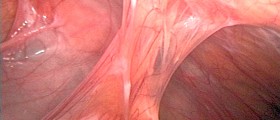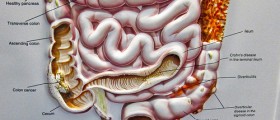
Bowel obstruction or intestinal obstruction can be either mechanical or functional. It can occur in any part of the bowel, where it impedes normal transit of digested materials. Bowel obstruction presents a medical emergency and it usually requires a surgical intervention.
The term ileus is today used mostly to describe non-mechanical bowel obstruction. Sometimes the term paralytic ileus is used in case when the problem consists of the inactivity of the bowel.
Causes of bowel obstruction
In the small intestine, the possible causes of bowel obstruction include adhesions from previous surgeries in the region, Crohn’s disease, hernias, growths, either benign or malignant, ischaemic strictures, volvulus, intestinal atresia and foreign bodies struck in the bowel. In the large intestine, the causes may involve growths, hernias, inflammatory bowel disease, constipation, fecal impaction, atresia, diverticulitis and endometriosis.
Symptoms of bowel obstruction
Bowel obstruction is widely characterized by colicky pain in the abdomen, nausea and vomiting. Vomiting is particularly unpleasant if feculent, resulting from retrograde peristalsis where the fecal matter is pushed back instead of front. This symptom is characteristic for lower obstruction, rather than for high level obstruction.
Bowel obstruction also causes constipation, lesions, distension of the abdomen, and, in case of ischemia or perforation, severe pain and tenderness.
A patient suffering from bowel obstruction will most likely show signs of hypotension, tachycardia and poor peripheral perfusion.
Management of bowel obstruction
Since bowel obstruction can be fatal, it is important to admit the patient in the intensive care unit, where he or she will be closely monitored with vital signs kept at normal values before the problem is addressed surgically. In some cases resuscitation may be necessary.
Bowel obstruction often leads to dehydration and the patient must receive intravenous fluids and electrolytes.
In most cases bowel obstruction is resolved through surgery, which usually involves laparotomy. In laparotomy, the surgeon will search the bowel for the cause of obstruction and remove it, if possible. The nature of the cause will determine the next step in treatment. For example, if the obstruction is caused by a tumor, it needs to be sent for biopsy and, if malignant, the oncologist will decide on appropriate cancer treatment. The surgeon will also look for metastases in the surrounding structures.
Less severe cases, those characterized by incomplete obstruction or with signs of pseudo-obstruction may be treated through a more conservative approach. Since there is always the risk of perforation, toxin release and other complications, patients are often given prophylactic antibiotics.

















Your thoughts on this
Loading...